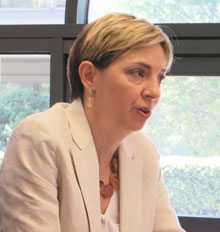Will President Sisi Bring Stability to Egypt?
Michele Dunne, Carnegie Endowment for International Peace
Photos | Transcript

Washington, DC—On July 1, 2014, Michele Dunne, a senior associate at the Carnegie Endowment for International Peace, talked to WFPG members and guests about whether President Sisi will bring stability to Egypt. Dunne discussed what it would take to achieve stability and prosperity in Egypt, as well as Egyptian relations with other Arab countries and with the United States. The event was moderated by WFPG President Patricia Ellis.
In terms of achieving stability, Dunne argued that the Sisi administration’s repressive policies, such as restrictions on press and political freedoms, are exacerbating the deep divisions in Egyptian society rather than building consensus. While many observers have cast Egypt’s situation as a choice between democracy versus stability and prosperity, Dunne sees this as an outdated and inaccurate assessment of the realities in Egypt. Just because Egypt’s democratic opening has closed does not mean Egyptians will be gaining stability and prosperity, she warned. Since the toppling of Morsi, the situation in Egypt has grown even more tumultuous. In the past year, Egypt has had both the worst human rights abuses as well as the most intense domestic terrorism in its modern history, Dunne said. The grievances Egyptians had in 2011 are still present and unresolved, while many freedoms are more severely restrained now than under Mubarak. Specifically, she cited the imprisonment of thousands of Muslim Brotherhood supporters, the draconian new protest law, and the harsh sentencing of three Al Jazeera journalists as examples of the government crackdown. Dunne argued that as long as this repressive climate persists, stability is unlikely.
Dunne also discussed the prospects for prosperity in Egypt, which has faced an ongoing economic crisis. “One could ask, could President Sisi be the Pinochet of Egypt?” Dunne remarked, referring to the Chilean military dictator who many credit as responsible for that country’s economic growth. While theoretically a possibility, she cited Sisi’s tendency toward a more statist view of the economy, the struggling tourism industry, and the problem of massive distortions from government energy subsidies as potential roadblocks to economic growth. Sisi has temporarily been able to manage the economic crisis thanks to the billions of dollars of aid being sent by Gulf countries, but this is only a short-term solution, Dunne said. The influx of Gulf aid also has foreign policy implications for Egypt, increasing its reliance on its major donors, Saudi Arabia, the United Arab Emirates, and Kuwait. Under President Morsi, Egypt received large amounts of assistance from Qatar, but relations between the two nations have grown tense since Morsi’s ouster. While the Gulf aid is keeping Egypt solvent for the moment and is expected to continue next year, Dunne predicted that the country will eventually want to negotiate a deal with the IMF in order to attract both domestic and foreign investment.
On the issue of Egyptian-US relations, Dunne urged a reevaluation of US policy toward Egypt, critiquing the US’s attempt to “ride the tiger” of shifting Egyptian power since 2011. Although the US must maintain a good security relationship with Egypt, she called for a more principled American policy in support of democracy. She stressed that American engagement in Egypt is far too heavily weighted in military assistance, with less focus on civil society and human development programs. Political inclusion and consensus-building amongst Egyptians should also be priorities guiding US aid to Egypt. Dunne emphasized that investing in these areas is just as important for counterterrorism efforts and long-term stability as military assistance.